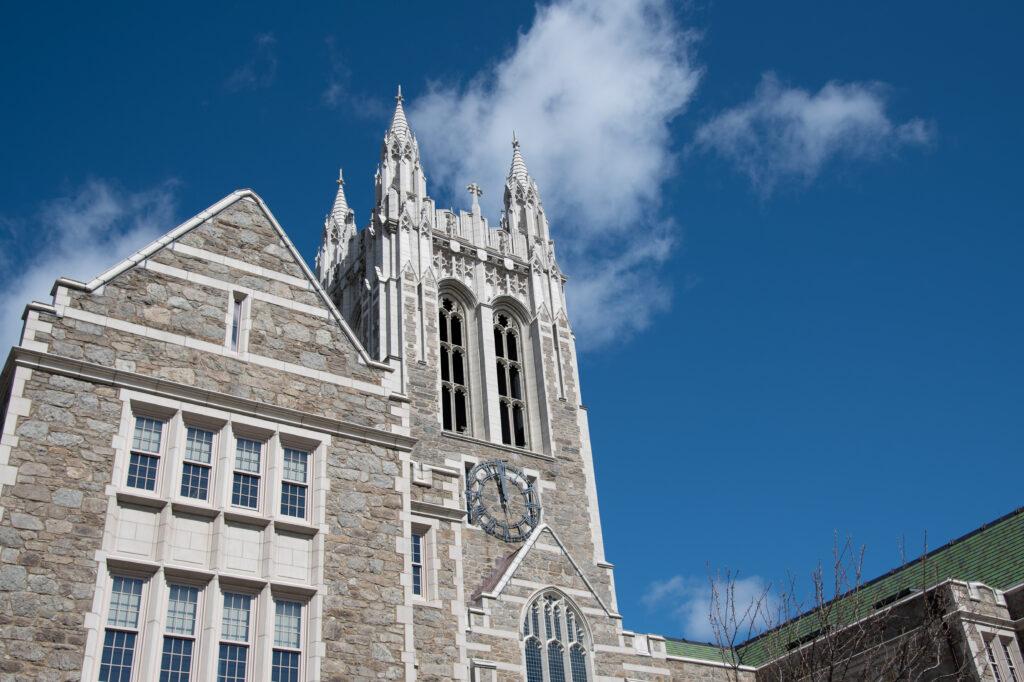Mara Hermano, the vice president of institutional research and planning, read the results of a 2018 survey detailing the experiences of minority students at BC at the March 30 meeting for freshman and sophomores living on College Road.
Shortly after Hermano listed the survey findings, numerous students submitted the message, “the people that yelled racial slurs on the MLE floor are walking free on campus with no punishment.” The host of the webinar then disabled the chat before the webinar unexpectedly shut off, 15 minutes after the meeting began.
University administrators were not available for comment on what caused the technical difficulties and why the chat was disabled.
The data was taken from a student experience survey conducted from October to December of 2018 that garnered 2,417 student responses, an overall response rate of 26 percent, Hermano said.
The survey found that Black, Hispanic, Asian, and mixed-race students found BC to be less welcoming and felt less of a sense of community on campus than white students did. It also showed that Black, Asian, and Hispanic students felt less safe on campus than did their white counterparts.
The data also showed that LGBTQ+ students felt less safe and less of a sense of belonging at BC than students who did not identify as LGBTQ+.
Students coming from families with incomes of below $50,000, and between $50,000 and $150,000, also felt less welcome, safe, and less of a sense of community than students coming from families with incomes greater than $150,000.
“As the data shows, the experiences of Black and brown students, LGBTQ+ students, and those with high financial need are significantly different than white students, and this is important to recognize and acknowledge,” Joy Moore, executive director of the Pine Manor Institute for Success, said. “Even though the experience is different, it does not mean that Black and brown students, LGBTQ+ students, and those with high financial need are any less deserving of belonging at BC.”
Patricia Lowe, executive director of the Office of Diversity and Inclusion, demonstrated how to report bias incidents and hate crimes to the University. She first provided definitions for both terms.
“And particularly with hate crimes, they are adjudicated through the criminal system,” Lowe said. “Biased incidents, however, are grounded and adjudicated through our Student Conduct Office, and for employees, through the employee employment policies and processes.”
Students can also report bias incidents and hate crimes to resident assistants, faculty, or administrators, Lowe added.
Students may file reports of bias incidents and hate crimes anonymously, but doing so may limit the Office of Student Conduct’s ability to follow up with those who filed the complaints, according to Tom Mogan, associate vice president for student engagement and formation.
Mogan also explained the differences between status sanctions—which include warnings, university suspensions, and dismissals—and formative sanctions, which are designed to hold students accountable for behavior while simultaneously educating them on how to improve moving forward.
Mogan said federal laws prevent the Office of Student Conduct from reporting disciplinary outcomes.
“Due to federal privacy laws, including FERPA, the conduct office is not able to share specific outcomes or sanctions with the community,” he said.
Michael Lochhead, executive vice president and acting vice president for student affairs, emphasized that it is important for the BC community to actively strive for a more inclusive campus.
“It is one thing to be ignorant to or unaware of the climate on campus with respect to these issues,” Lochhead said. “It’s another thing to know about them and not care or not do anything about it. We need to work together to change this because we’re all part of the same community. Every person at BC—students, faculty, and staff members—deserve to be treated with dignity and the utmost respect.”
Featured Image by Nicole Vagra / For The Heights







